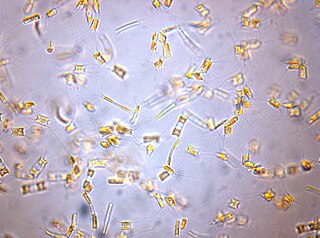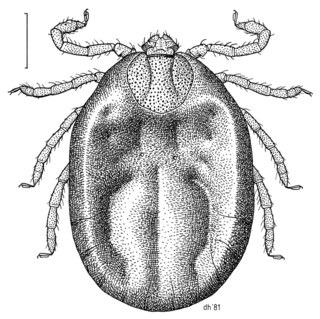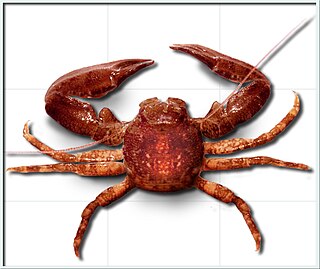Related Research Articles

Paratrechina is one of seven ant genera in the Prenolepis genus-group from the subfamily Formicinae. Six species are included in Paratrechina; one of which, the longhorn crazy ant, is a widespread, pantropical pest.

The Luzon scops owl is an owl endemic to Luzon, Philippines. There are no subspecies.

Attheya longicornis is a species of diatoms in the genus Attheya. Type material was collected from Penberth, Cornwall in England.

Haemaphysalis longicornis, the Asian longhorned tick, longhorned tick, bush tick, Asian tick, or cattle tick, is a parasitic arachnid belonging to the tick family Ixodidae. The Asian longhorned tick is a known livestock pest, especially in New Zealand, and can transmit a disease called theileriosis to cattle but not to humans. However, the tick has been associated with several other tickborne diseases in humans.

Pisidia longicornis, the long-clawed porcelain crab, is a species of porcelain crab that lives in the north-eastern Atlantic Ocean. It varies from reddish to white, and grows to a carapace width of 1 cm (0.4 in). It was first named by Carl Linnaeus in 1767, although the etymology remains unclear.

The longhorn crazy ant, also known as "black crazy ant", is a species of small, dark-coloured insect in the family Formicidae. These ants are commonly called "crazy ants" because instead of following straight lines, they dash around erratically. They have a broad distribution, including much of the tropics and subtropics, and are also found in buildings in more temperate regions, making them one of the most widespread ant species in the world. This species, as well as all others in the ant subfamily Formicinae, cannot sting.
Copelatus longicornis is a species of diving beetle. It is part of the genus Copelatus in the subfamily Copelatinae of the family Dytiscidae. It was described by Sharp in 1882.

Pterolophia is a genus of longhorn beetles of the subfamily Lamiinae, containing the following species:

Myja longicornis is a species of sea slug, an aeolid nudibranch, a marine gastropod mollusc in the family Tergipedidae. It was thought to be a close relative of Tergipes but molecular phylogeny reveals it to be a paedomorphic facelinid.

Eucalyptus longicornis, commonly known as red morrel, morryl, poot or pu, is a species of large tree that is endemic to the south-west of Western Australia. It has rough, fibrous, fissured bark on the trunk, smooth greyish bark above, flower buds in groups of seven or more, white flowers and shortened spherical fruit.
Pterolophia ingrata is a species of beetle in the family Cerambycidae. It was described by Francis Polkinghorne Pascoe in 1864.

Pterolophia melanura is a species of beetle in the family Cerambycidae. It was described by Francis Polkinghorne Pascoe in 1857. It has a wide distribution in Asia.
Pterolophia gibbosipennis is a species of beetle in the family Cerambycidae. It was described by Maurice Pic in 1926.
Pterolophia instabilis is a species of beetle in the family Cerambycidae. It was described by Per Olof Christopher Aurivillius in 1922. It is known from Seychelles.
Pterolophia angulata is a species of beetle in the family Cerambycidae. It was described by Hermann Julius Kolbe in 1893. It has a wide distribution in Africa. It feeds on Lagerstroemia indica.
Pterolophia guineensis is a species of beetle in the family Cerambycidae. It was described by James Thomson in 1864, originally under the genus Alyattes.
Obereopsis longicornis is a species of beetle in the family Cerambycidae. It was described by Hintz in 1919.

Spilomyia longicornis is a species of syrphid fly, also known as a flower fly or hoverfly, in the family Syrphidae. Although the appearance of S. longicornis is remarkably similar to a vespid wasp, it is a fly and cannot sting. It occurs in North America, east of the Rocky Mountains.
Myrabolia is the only genus in the beetle family Myraboliidae. It has about 13 species, found in Australia.
References
- ↑ BioLib.cz - Pterolophia longicornis. Retrieved on 8 September 2014.